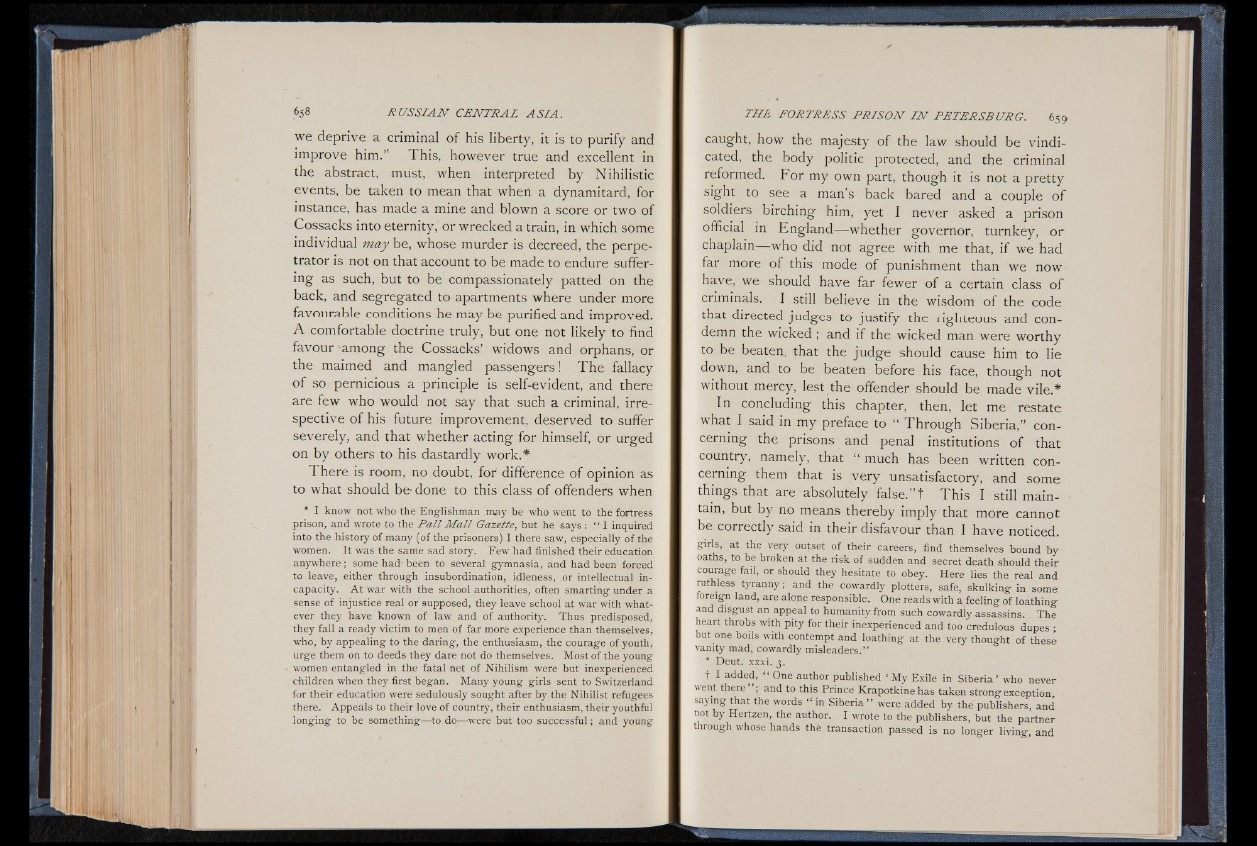
we deprive a criminal of his liberty, it is to purify and
improve him.” This, however true and excellent in
the abstract, must, when interpreted by Nihilistic
events, be taken to mean that when a dynamitard, for
instance, has made a mine and blown a score or two of
Cossacks into eternity, or wrecked a train, in which some
individual may be, whose murder is decreed, the perpetrator
is not on that account to be made to endure suffering
as such, but to be compassionately patted on the
back, and segregated to apartments where under more
favourable conditions he may be purified and improved.
A comfortable doctrine truly, but one not likely to find
favour among the Cossacks’ widows and orphans, or
the maimed and mangled passengers! The fallacy
of so pernicious a principle is self-evident, and there
are few who would not say that such a criminal, irrespective
of his future improvement, deserved to suffer
severely, and that whether acting for himself, or urged
on by others to his dastardly work.*
There is room, no doubt, for difference of opinion as
to what should be- done to this class of offenders when
* I know not who the Englishman may be who went to the fortress
prison, and wrote to the P a ll M a ll Gazette, but he s a y s : “ I inquired
into the history of many (of the prisoners) I there saw, especially of the
women. It was the same sad story. Few had finished their education
anywhere; some had' been to several gymnasia, and had been forced
to leave, either through insubordination, idleness, or intellectual incapacity.
A t war with the school authorities, often smarting under a
sense of injustice real or supposed, they leave school at war with whatever
they have known of law and of authority. Thus predisposed,
they fall a ready victim to men of far more experience than themselves,
who, by appealing to the daring, the enthusiasm, the courage of youth,
urge them on to deeds they dare not do themselves. Most of the young
women entangled in the fatal net of Nihilism were but inexperienced
children when they first began. Many young girls sent to Switzerland
for their education were sedulously sought after by the Nihilist refugees
there. Appeals to their love of country, their enthusiasm, their youthful
longing to be something— to do,—were but too successful; and young
caught, how the majesty of the law should be vindicated,
the body politic protected, and the criminal
reformed. For my own part, though it is not a pretty
sight to see a man’s back bared and a couple o f
soldiers birching him, yet I never asked a prison
official in England— whether governor, turnkey, or
chaplain— whq did not agree with me that, if we had
far more of this mode of punishment than we now
have, we should have far fewer of a certain class o f
criminals. I still believe in the wisdom of the code
that directed judges to justify the righteous and condemn
the wicked ; and if the wicked man were worthy
to be beaten, that the judge should cause him to lie
down, and to be beaten before his face, though not
without mercy, lest the offender should be made vile.*
In concluding this chapter, then, let me restate
what I. said in my preface to “ Through Siberia,” concerning
the prisons and penal institutions of that
country, namely, that “ much has been written concerning
them that is very unsatisfactory, and some
things that are absolutely false.” t This I still maintain,
but by no means thereby imply that more cannot
be correctly said in their disfavour than I have noticed.
girls, at the very outset of their careers, find themselves bound by
oaths, to be broken at the risk of sudden and secret death should their
courage fail, or should they hesitate to obey! Here lies the real and
ruthless tyranny ; and the cowardly plotters, safe, skulking in some
foreign land, are alone responsible. One reads with a feeling of loathing
and disgust an appeal to humanity from such cowardiy assassins. The
heart throbs with pity for their inexperienced and too credulous dupes ;
but one boils with contempt and loathing at the very thought of these
vanity mad, cowardly misleaders.”
* Deut. xxxi. 3.
t I added, ‘ One author published ‘ My Exile in Siberia ’ who never
went there” ; and to this Prince Krapotkine has taken strong exception,
saying that the words “ in Sib e ria ” were added by the publishers, and
not by Hertzen, the author. I wrote to the publishers, but the partner
through whose hands thè transaction passed is no longer living, and